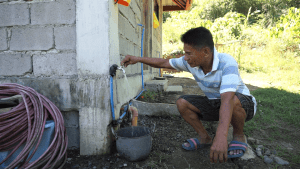
In farming communities that rely heavily on the rains in growing their crops, a simple improvement in their irrigation system could change their lives for the better.
Just like in many farming communities in the lowland areas in the Province of Abra, Barangay Tangadan, San Quintin produce crops depending on the season.
Farmers who cannot afford water pumps wait for the rainy season before they could plant rice. Consequently, they leave their farms unproductive in the summer. For farmers who own water pumps can plant all year round. They grow vegetables or tobacco during the summer and plant rice come the rainy season.
When a chance to improve their production came knocking to them, “the community saw it as an opportunity to address our problem on low farm production during the dry season,” says incumbent Punong Barangay Geronimo Pajara.
When the Kapit-bisig Laban sa Kahirapan-Comprehensive and Integrated Delivery of Social Services (Kalahi-CIDSS) was introduced to the barangay back in 2011, the community identified a fuel-generated communal irrigation system as their top priority need.
Kalahi-CIDSS is an anti-poverty reduction program of the Department of Social Welfare and Development that uses the community-driven development strategy to empower poor communities.
After a series of consultations, residents of Barangay Tangadan decided to propose an irrigation system that would benefit the most affected farmers in the barangay.
“Without a good irrigation system, watering the plants may not be done on time which will lead to lower yield. Irrigating the farms later than its supposed schedule affects the quality and quantity of products and the time of its harvest,” Pajara continued.
Fortunately, their project proposal was prioritized and soon after, the community found themselves implementing the project. “The residents were really delighted when they heard about the news,” exclaimed Pajara who was a community volunteer at that time.
In 2012, the communal irrigation system was successfully completed. Since then, the community enjoyed the ease of irrigating their farms.
The two-in-one innovation
During a visit to the barangay, the DSWD Kalahi-CIDSS team discovered an improvement in the communal irrigation system. The system is not only used for irrigation now, but it also supplies water for the households in the barangay.
“Since we had savings from our operation and maintenance fund, the barangay decided to get an electricity connection with ABRECO and buy an electric water pump to upgrade the communal irrigation system,” Pajara narrated.
Originally, the project was fuel-generated but after it was upgraded into an electric-generated irrigation system, the volume of water it generated increased thus it can also supply enough water for domestic uses.
The barangay then installed tapping points near the main settlement. Pajara said that residents bought their own hoses so they can connect from designated tapping points. “The residents’ counterpart is to buy their own hoses or pipes for the water to reach their houses,” he added.
In addition, the barangay also established a payment system for their electric bill. “We have designated an officer to collect payments from each household,” Pajara continued. The collection officer keeps the records of payment and is responsible in paying their bill to ABRECO. As compensation to the work, the collection officer is exempted from paying his/her electric bill as compensation to the collection officer’s work, he/she is exempted from paying
For Lilibeth Valdez, the improvements in their water system enabled her to start a livelihood to have an additional income for her family. “I started raising pigs since there was enough water to clean the pig pens. My electric bill is twice higher than those who do not raise animals, but it is definitely worth it,” she explained.
She added that back when their water system was not yet improved she used to order for water delivery which is more expensive than what she pays now. “We used to stock water good for one week, but now we can just open the faucet when we do house chores,” she said. #DSWD-CAR, SOCIAL MARKETING UNIT, Jasmin Kiaso




